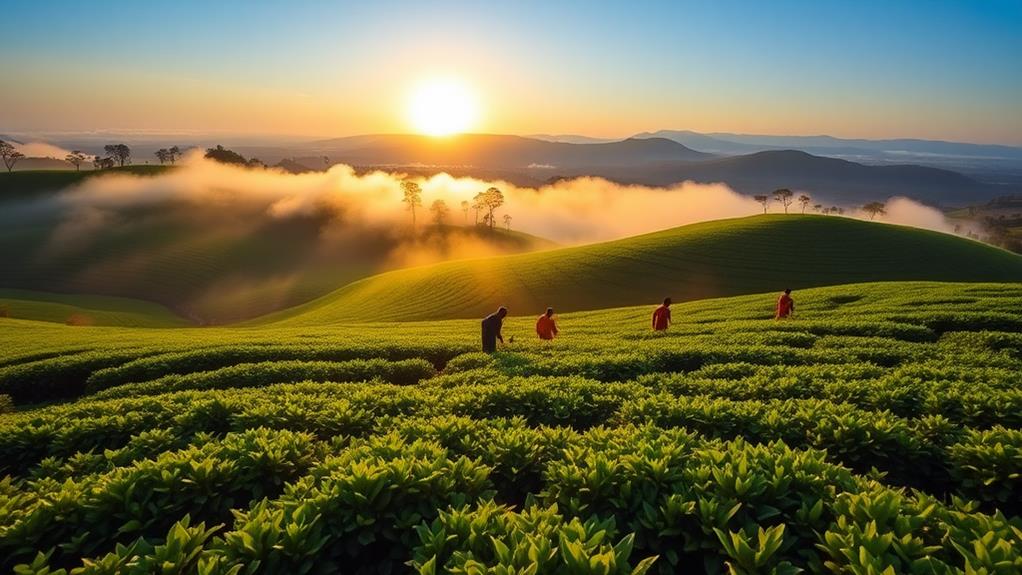Kenya's ideal conditions make it a tea-growing powerhouse. You've got warm temperatures and plenty of rainfall, which keep tea plants happy and healthy. The rich volcanic soil provides essential nutrients, contributing to the unique flavors that Kenyan tea is known for. High-altitude regions also help slow growth, enhancing those delicious taste profiles you love. Plus, strategic farming practices and government support guarantee quality and sustainability. With increasing global demand for this flavorful tea, Kenya continues to thrive in the market. All in all, there's a lot more to discover about why Kenya's tea is so special!
Ideal Climate Conditions
When it comes to growing tea in Kenya, the ideal climate conditions play a crucial role. You'll find that tea thrives in regions with warm temperatures and plenty of rainfall. Most tea plants love temperatures between 60°F and 80°F. This range helps them develop those rich flavors you enjoy in your cup.
Additionally, the unique properties of Kenyan tea contribute to its high antioxidant content, making it not just flavorful but also beneficial for health, as it can unlock amazing health benefits.
Rainfall is another key factor; tea plants need around 40 to 60 inches of rain a year. That consistent moisture keeps the plants hydrated and happy. You might think the sun is all they need, but too much direct sunlight can actually stress the plants. So, a bit of cloud cover or shade can be a good thing!
Altitude also matters, but we'll save that for later. For now, just know that growing tea in areas with rich, well-draining soil can make a huge difference. It's like giving the plants a cozy home where they can flourish.
High-Altitude Regions
When you think about tea from Kenya, high-altitude regions play a key role in its quality.
The cooler temperatures and rich soil nutrients here create the perfect conditions for growing flavorful tea.
You'll find that these unique factors not only enhance the taste but also contribute to the overall character of the tea you enjoy.
Optimal Climate Conditions
High-altitude regions of Kenya provide the perfect environment for tea cultivation due to their unique climate conditions. You'll find these areas typically feature cooler temperatures, abundant rainfall, and consistent sunlight, all of which are vital for growing high-quality tea.
Here's what makes it special:
- Cooler Temperatures: The higher altitude slows down the growth rate of tea plants, allowing the leaves to develop richer flavors and aromas. This leads to a more complex taste profile that tea enthusiasts adore.
- Consistent Rainfall: These regions receive ample rainfall, ensuring that the tea plants remain hydrated. This steady water supply prevents stress on the plants, helping them to thrive throughout the growing season.
- Sunlight Exposure: The combination of altitude and clear skies offers plenty of sunlight, which is essential for photosynthesis. This boosts the plants' growth and enhances the quality of the leaves you'll eventually brew.
In essence, the unique climate in Kenya's high-altitude regions creates an innovative environment for tea cultivation, allowing you to enjoy a cup of tea with exceptional flavor and quality.
It's no wonder that Kenyan tea is celebrated worldwide!
Rich Soil Nutrients
The rich soil nutrients found in Kenya's high-altitude regions play an essential role in producing exceptional tea. These areas, often located above 4,000 feet, are blessed with volcanic soil, which is naturally fertile and packed with crucial minerals. When you think about growing tea, you want a foundation that supports robust plant growth, and Kenya's soil does just that.
The unique blend of nutrients, including nitrogen, phosphorus, and potassium, boosts the health of the tea plants, allowing them to thrive. This nutrient-rich environment encourages deep root systems, which helps the plants absorb moisture and minerals more effectively.
The high altitude also means cooler temperatures and frequent rainfall, creating an ideal habitat for tea cultivation.
If you're passionate about innovation in agriculture, consider how these natural advantages can inspire sustainable farming practices. By understanding the importance of soil health, you can appreciate the delicate balance that nature provides.
It's exciting to think that this rich soil not only nourishes the tea plants but also contributes to Kenya's reputation as a top tea producer. So, next time you sip your Kenyan tea, remember the incredible nutrients that helped bring it to your cup!
Enhanced Flavor Profiles
Kenya's high-altitude regions don't just provide rich soil; they also contribute to the tea's unique flavor profiles. When you sip Kenyan tea, you're experiencing a blend of flavors that's shaped by the environment.
The altitude, combined with cool temperatures and misty conditions, creates an ideal setting for tea plants to thrive, enhancing their taste. This environment not only promotes the development of distinct flavors but also delivers health benefits, as antioxidants in tea can improve heart health and reduce disease risk.
Here are three key factors that influence these enhanced flavor profiles:
- Temperature Variation: The cooler nights and warmer days at high altitudes slow the growth of tea leaves, allowing for a more concentrated flavor development.
- Soil Composition: Rich volcanic soil holds nutrients that deepen the tea's taste, resulting in a more complex flavor profile.
- Humidity Levels: The misty conditions provide the right amount of moisture, which helps the tea leaves develop aromatic compounds that elevate their taste.
These elements make Kenyan tea distinct and invigorating.
So, the next time you brew a cup, remember it's not just a drink; it's a fusion of nature's innovation, crafted by high-altitude conditions that produce a tea experience unlike any other.
Enjoy the journey!
Fertile Soils
When you think of tea, the quality of the soil often plays an essential role in its flavor and growth. In Kenya, the rich, fertile soils are a game changer for tea cultivation. These soils are packed with nutrients that promote strong plant development.
Regular consumption of tea, especially varieties grown in such nutrient-rich soils, can aid in preventing heart disease and support overall wellness and longevity, making it not just a delightful beverage but also a healthful choice exceptional health benefits. Imagine a salad that's bursting with flavor—this is what tea can achieve when grown in ideal conditions!
The volcanic ash in Kenyan soil is particularly remarkable. It's like nature's secret ingredient, providing essential minerals that enhance the tea leaves' taste and aroma. The earth here isn't just dirt; it's a treasure chest of organic matter, making it perfect for growing lush tea bushes.
Innovative farming practices also help maintain the soil's health. Farmers are using techniques like crop rotation and organic fertilizers, ensuring that the land remains productive year after year.
This commitment to sustainability means that not only do you enjoy great-tasting tea, but you're also supporting a thriving ecosystem.
Consistent Rainfall
When you think about tea grown in Kenya, consistent rainfall plays a key role in creating the perfect climate.
This reliable source of water not only helps the tea plants thrive but also makes irrigation easier during drier spells.
Plus, the seasonal rain patterns contribute to the rich flavors and quality of the tea you enjoy!
Ideal Climate Conditions
Tea thrives in regions where consistent rainfall is plentiful, making it crucial for ideal growth. In Kenya, the conditions are just right, providing a nurturing environment for tea plants to flourish. The rich tea culture and diverse varieties further enhance the appeal of Kenyan tea.
But what makes this consistent rainfall so beneficial? Here are three key factors:
- Optimal Moisture: Regular rainfall guarantees that tea plants receive the moisture they need to grow strong and healthy. This hydration boosts the production of high-quality leaves that tea lovers appreciate. Rooibos tea, for example, also benefits from specific climatic conditions, highlighting the significance of environment in tea production health benefits of rooibos tea.
- Temperature Regulation: Consistent moisture helps regulate the temperature around the tea plants. This balance prevents extreme heat or cold, creating a stable growing environment.
- Soil Health: Adequate rainfall contributes to the rich, fertile soils typical in tea-growing regions. It helps maintain nutrients in the soil, promoting robust plant growth and enhancing flavor profiles in the leaves.
With these ideal climate conditions, Kenya stands out as a leader in tea production.
Irrigation Source Reliability
Consistent rainfall not only supports the growth of tea plants but also guarantees a reliable source of irrigation. When you think about farming, water is your best friend. For tea growers in Kenya, regular rainfall ensures that the plants receive the right amount of moisture, which is vital for producing high-quality tea.
This dependable water supply allows farmers to focus on innovation, like experimenting with new growing techniques or sustainable practices, as well as promoting health benefits of green tea that can appeal to health-conscious consumers.
Imagine walking through lush tea fields, vibrant green leaves glistening after a fresh rain. This is the power of nature working hand in hand with agricultural practices. With consistent rainfall, farmers can reduce their reliance on artificial irrigation methods, which can often be costly and complicated. Instead, they can harness the natural cycles of rainfall to nourish their crops effectively.
Moreover, reliable rainfall supports the local ecosystem, promoting biodiversity and healthier soil. This creates a win-win situation, as it not only benefits the tea plants but also the surrounding environment.
Seasonal Rain Patterns
Although rainfall patterns can vary markedly across different regions, Kenya's tea-growing areas benefit from well-defined seasonal rains that play an important role in cultivation.
These consistent rain patterns provide the perfect environment for thriving tea plants. When you think about it, having dependable rainfall makes a huge difference for farmers and their crops.
Here are three key benefits of Kenya's seasonal rains:
- Optimal Growth Conditions: The steady rainfall guarantees that tea plants receive enough moisture, promoting healthy growth and high-quality leaves.
- Predictable Harvests: With reliable seasonal rains, farmers can plan their planting and harvesting times more effectively, leading to improved yields.
- Soil Health: Regular rainfall helps in maintaining soil fertility, as it washes away harmful salts and replenishes nutrients that tea plants need to flourish.
In essence, Kenya's unique climate creates a harmonious relationship between the seasonal rains and tea cultivation.
This synergy not only supports local farmers but also positions Kenya as one of the world's leading tea producers.
Strategic Agricultural Investments
Investing strategically in agriculture can greatly enhance Kenya's tea sector, driving growth and sustainability. By channeling resources into modern infrastructure and technology, you can boost productivity and quality.
Imagine investing in efficient irrigation systems that not only conserve water but also guarantee consistent crop yields, even during dry spells.
Moreover, funding research initiatives can lead to better tea varieties that are resistant to pests and diseases. These innovations can greatly reduce losses and increase farmers' profits.
When you support training programs, you're empowering farmers with essential skills, enabling them to adopt best practices in tea cultivation.
Additionally, investing in agro-tourism can attract visitors to tea farms, creating new revenue streams. Picture tourists enjoying guided tours, learning about tea production while sipping freshly brewed cups. This not only showcases Kenya's rich tea heritage but also fosters community development.
All these strategic investments can create a ripple effect, enhancing the entire tea value chain.
Innovative Farming Techniques
Innovative farming techniques are transforming Kenya's tea industry, enabling farmers to enhance both yield and quality.
By embracing modern practices, you're not just growing tea; you're cultivating a sustainable future.
Here are three exciting techniques that can make a real difference:
- Precision Agriculture: Using sensors and drones, farmers can monitor soil health and moisture levels more accurately. This data helps you apply water and fertilizers exactly where they're needed, boosting your crop's productivity.
- Integrated Pest Management (IPM): Instead of relying solely on chemicals, you can use biological controls, like beneficial insects. This approach not only protects your tea plants but also promotes biodiversity and reduces costs.
- Agroforestry: By incorporating trees into your tea farms, you create a microclimate that benefits both your tea plants and the environment. Trees provide shade, improve soil fertility, and even add an extra source of income with fruits or timber.
Government Support and Policies
Government support plays an essential role in enhancing the effectiveness of innovative farming techniques in Kenya's tea industry. When the government invests in research and development, it opens the door for farmers like you to access cutting-edge agricultural methods. This support often includes funding for new technologies, training programs, and resources to help you adopt these innovations.
Policies that promote sustainable farming practices are significant too. They encourage you to focus on eco-friendly methods that not only boost productivity but also protect the environment. Additionally, the government often provides subsidies or incentives that make it easier for you to purchase modern equipment, helping you stay competitive in the global market.
Furthermore, government initiatives can improve infrastructure, making it simpler for you to get your tea to market. This includes better roads, storage facilities, and even access to clean water.
With all this support, you can experiment with new techniques and grow high-quality tea that stands out. The combined efforts of the government and farmers like you create a thriving tea industry in Kenya, ensuring it remains a key player in the global tea landscape.
Global Market Demand
Increasingly, the global market demand for Kenyan tea has been on the rise, driven by its unique flavor profiles and high-quality production standards. You might wonder what's fueling this growing interest. Let's break it down:
- Diverse Flavors: Kenyan tea offers a wide range of flavors, from bold and brisk to smooth and mellow, appealing to various palates around the world.
- Sustainable Practices: Many Kenyan tea producers focus on sustainable farming methods, which not only meet consumer demand for eco-friendly products but also enhance the quality of the tea.
- Health Benefits: With rising health consciousness, people are turning to tea for its numerous health benefits, like antioxidants and hydration, making Kenyan tea a sought-after option.
As you can see, the combination of unique flavors, sustainable practices, and health benefits makes Kenyan tea a star in the global market.
This surge in demand is exciting, as it not only boosts the economy of Kenya but also encourages innovation in tea production.
FAQ
What Types of Tea Are Primarily Grown in Kenya?
You'll find primarily black tea, green tea, and white tea grown in Kenya. The country's unique climate and altitude create ideal conditions for these varieties, making them popular among tea enthusiasts seeking quality and flavor.
How Does Tea Farming Impact Local Communities in Kenya?
Did you know tea farming supports over 600,000 families in Kenya? You'll find it boosts local economies, creates jobs, and fosters community development, driving innovation in sustainable practices while enhancing livelihoods and environmental stewardship.
Are There Any Environmental Concerns Regarding Tea Production in Kenya?
You'll find environmental concerns in Kenya's tea production, including deforestation, water depletion, and pesticide use. Addressing these issues through sustainable practices can help protect ecosystems while supporting the industry's growth and innovation for future generations.
What Are the Main Export Markets for Kenyan Tea?
Kenyan tea primarily targets markets in the UK, the Middle East, and the United States. You'll find its unique flavors appealing to consumers seeking quality, making it a staple in global tea exports.
How Has Climate Change Affected Tea Cultivation in Kenya?
Climate change's impacting your tea cultivation, causing unpredictable weather patterns and altering rainfall. You'll need to adapt with innovative practices, like drought-resistant varieties and efficient irrigation systems, to maintain productivity and quality in the changing climate.
Final Thoughts
To sum up, Kenya's tea production thrives like a well-tended garden, flourishing thanks to its perfect climate, rich soils, and supportive government. The combination of high-altitude regions and consistent rainfall creates an ideal environment for tea plants to grow. With innovative farming techniques and strategic investments, Kenya meets the global demand for tea while ensuring quality. So, the next time you sip a cup of Kenyan tea, remember the many factors that make it special!



